-
REVIEW05-03-2024
Elements of fatherhood involved in the gestational period: a scoping review
Revista Brasileira de Enfermagem. 2024;77(1):e20230029
Abstract
REVIEWElements of fatherhood involved in the gestational period: a scoping review
Revista Brasileira de Enfermagem. 2024;77(1):e20230029
DOI 10.1590/0034-7167-2023-0029
Views0See moreABSTRACT
Objective:
To identify in the literature and summarize the elements and characteristics of fatherhood involved during pregnancy.
Method:
Scoping review that used PRISMA-ScR guide to report this review. Searches were carried out in PubMed, CINAHL, PsycInfo, LILACS and Scopus. Google search engines and public health agency websites assisted in searches of gray literature and Rayyan in screening studies.
Results:
A total of 406 articles were identified, of which 16 made up the final sample. Five elements make up an involved fatherhood: feeling like a father, being a provider and protector, being a partner and participant in pregnancy, participating in prenatal appointments and feeling prepared to take care of a baby.
Conclusion:
Fathers want to be involved in prenatal care, but feel excluded from this process. Public policies that encourage paternal involvement and healthcare professional training to better welcome and promote paternal involvement are of paramount importance.
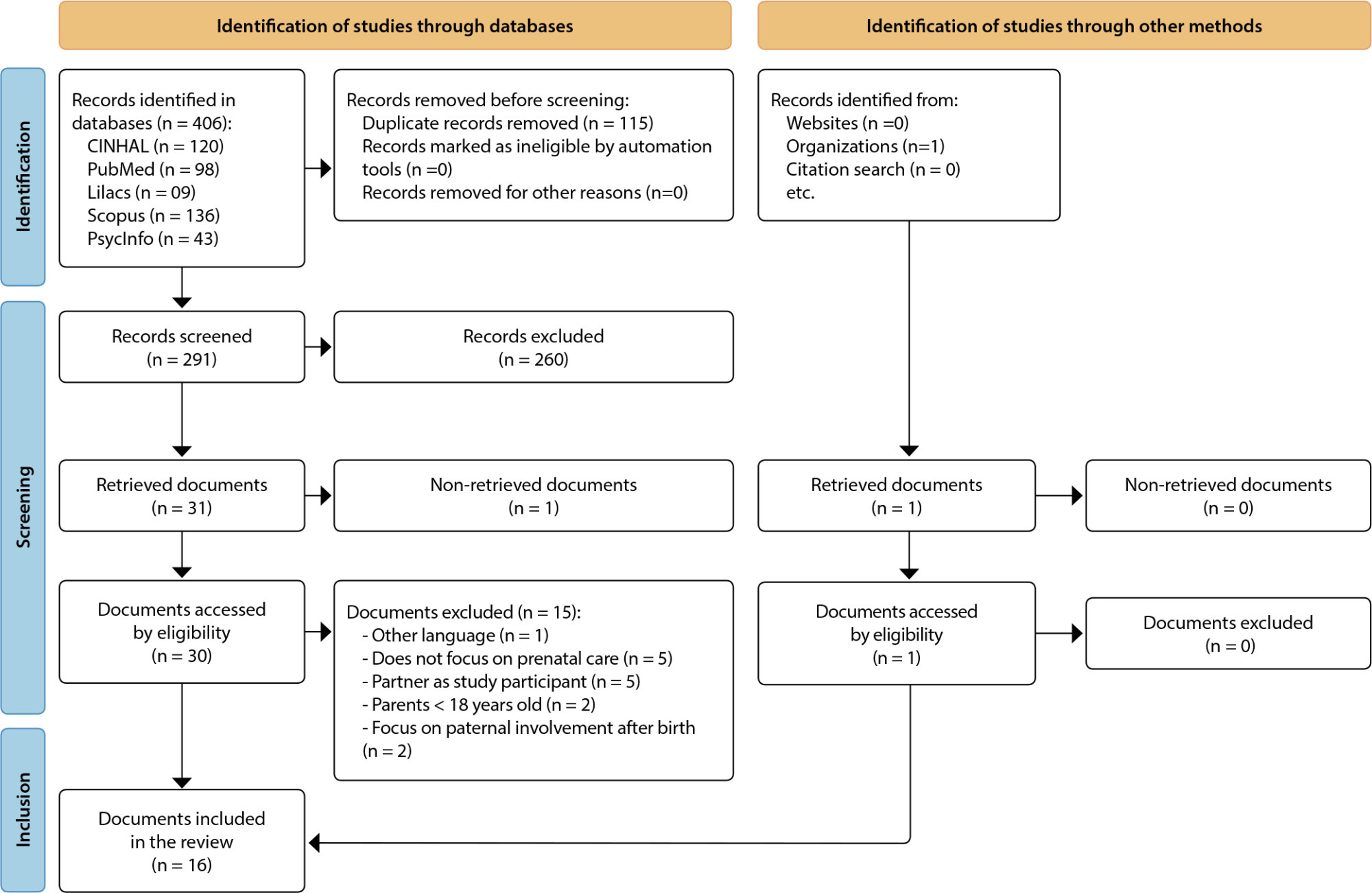
-
ORIGINAL ARTICLE05-03-2024
Josicélia Dumêt Fernandes’ professional trajectory: contributions to psychiatric and mental health nursing
Revista Brasileira de Enfermagem. 2024;77(1):e20230174
Abstract
ORIGINAL ARTICLEJosicélia Dumêt Fernandes’ professional trajectory: contributions to psychiatric and mental health nursing
Revista Brasileira de Enfermagem. 2024;77(1):e20230174
DOI 10.1590/0034-7167-2023-0174
Views0See moreABSTRACT
Objectives:
to analyze nurse Josicélia Dumêt Fernandes’ life story, with emphasis on her work in the psychiatry and mental health fields.
Methods:
historical, qualitative research. Semi-structured interviews and documentary research were used as data collection techniques, collected from September to October 2021. For data analysis, we opted for the content analysis method and comparison with the Foucauldian philosophical framework.
Results:
four categories emerged: Transforming herself and mental health practices; (Re)framing professional practice; Nursing practice and power relations; and The paths and implications in the psychiatry and mental health fields.
Final Considerations:
the study of the biographer demonstrates a search for transformation of herself and mental health practices, with a rupture in paradigms and reframing of her practice in psychiatry and mental health.
-
ORIGINAL ARTICLE05-03-2024
Psychometric properties of the Chilean version of the quality of life questionnaire for multiple myeloma
Revista Brasileira de Enfermagem. 2024;77(1):e20230100
Abstract
ORIGINAL ARTICLEPsychometric properties of the Chilean version of the quality of life questionnaire for multiple myeloma
Revista Brasileira de Enfermagem. 2024;77(1):e20230100
DOI 10.1590/0034-7167-2023-0100
Views0See moreABSTRACT
Objectives:
To evaluate the internal consistency and construct validity of the QLQ-MY20 for assessing the quality of life in multiple myeloma survivors in Chile.
Methods:
This was a cross-sectional study conducted between March 2020 and December 2022. It involved 118 individuals from two public hospitals. The QLQ-C30 and QLQ-MY20 questionnaires were used. Internal consistency was assessed using Cronbach’s alpha(α), and construct validity was evaluated through hypothesis testing (Mann-Whitney and Spearman correlation).
Results:
The average age of participants was 67.2 years (SD=9.2). Internal consistency for the complete scale was α=0.779, for the “disease symptoms” dimension α=0.671, for the “side effects of treatments” dimension α=0.538, and for the “future perspective” dimension α=0.670. Four of the five construct validity hypotheses were confirmed: women, individuals with worse performance status, those with pain, and those with worse fatigue showed more symptoms.
Conclusions:
The Chilean version of the QLQ-MY20 demonstrates adequate internal consistency and construct validity.
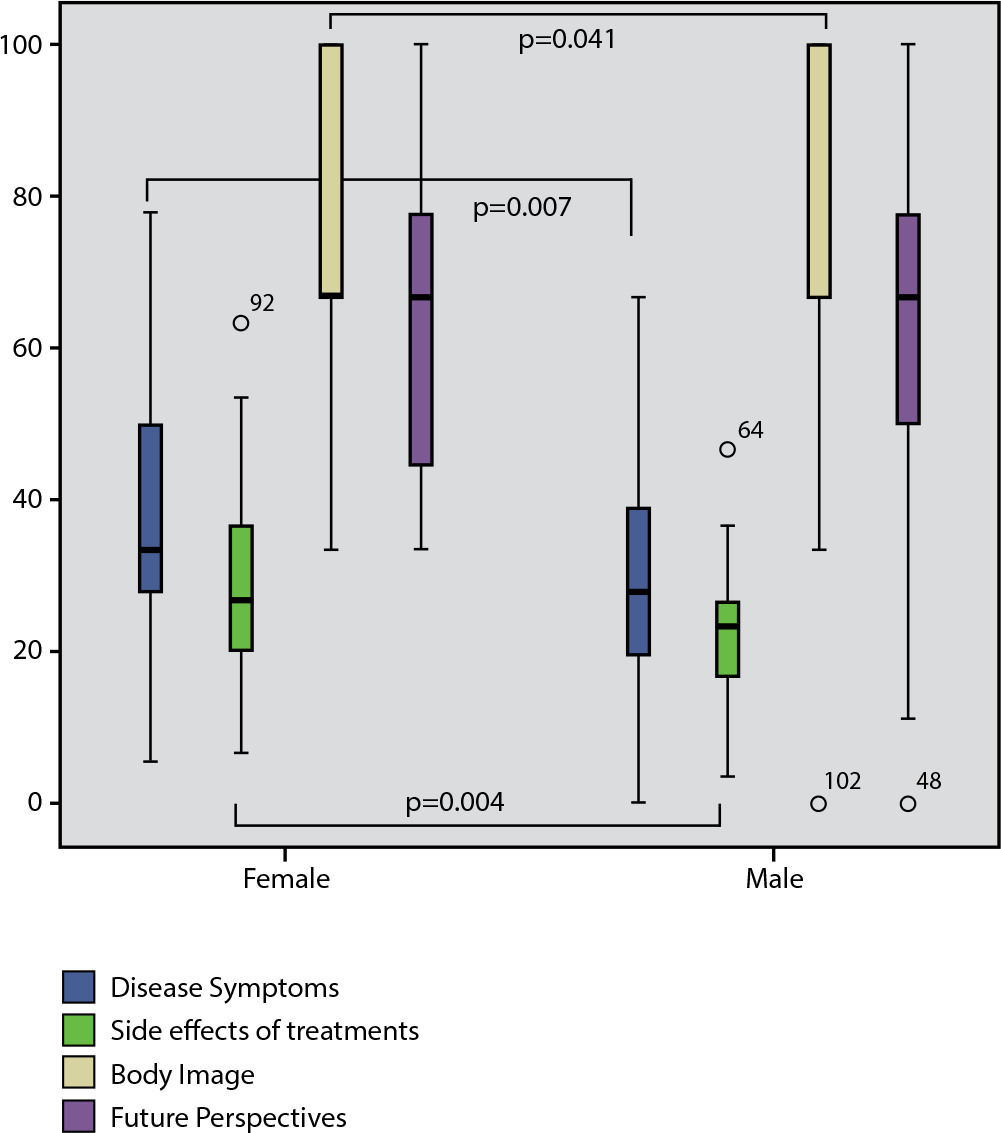
-
ORIGINAL ARTICLE05-03-2024
Pregnancy loss in women with systemic lupus erythematosus: Grounded Theory
Revista Brasileira de Enfermagem. 2024;77(1):e20230225
Abstract
ORIGINAL ARTICLEPregnancy loss in women with systemic lupus erythematosus: Grounded Theory
Revista Brasileira de Enfermagem. 2024;77(1):e20230225
DOI 10.1590/0034-7167-2023-0225
Views0See moreABSTRACT
Objective:
to learn the meanings attributed to pregnancy loss by women with Lupus.
Method:
qualitative research, based on Symbolic Interactionism and Grounded Theory. Data collection took place between January and August 2022 through in-depth interviews. Data analysis went through the stages of initial and focused coding.
Results:
seventeen women participated. The central phenomenon “The climb to motherhood: falls and overcoming” was constructed, consisting of three categories: “Falling to the ground during the climb: the experience of pregnancy loss”; “Getting up and following the path: new attempts to conceive”; and “Remembering the journey: meanings attributed to pregnancy losses”.
Final considerations:
experiencing pregnancy is, analogously, like climbing a mountain, where obstacles need to be overcome to reach the summit. The experience of pregnancy loss is seen as complex, especially when there is fragility in healthcare and a lack of awareness regarding feelings of loss and grief.
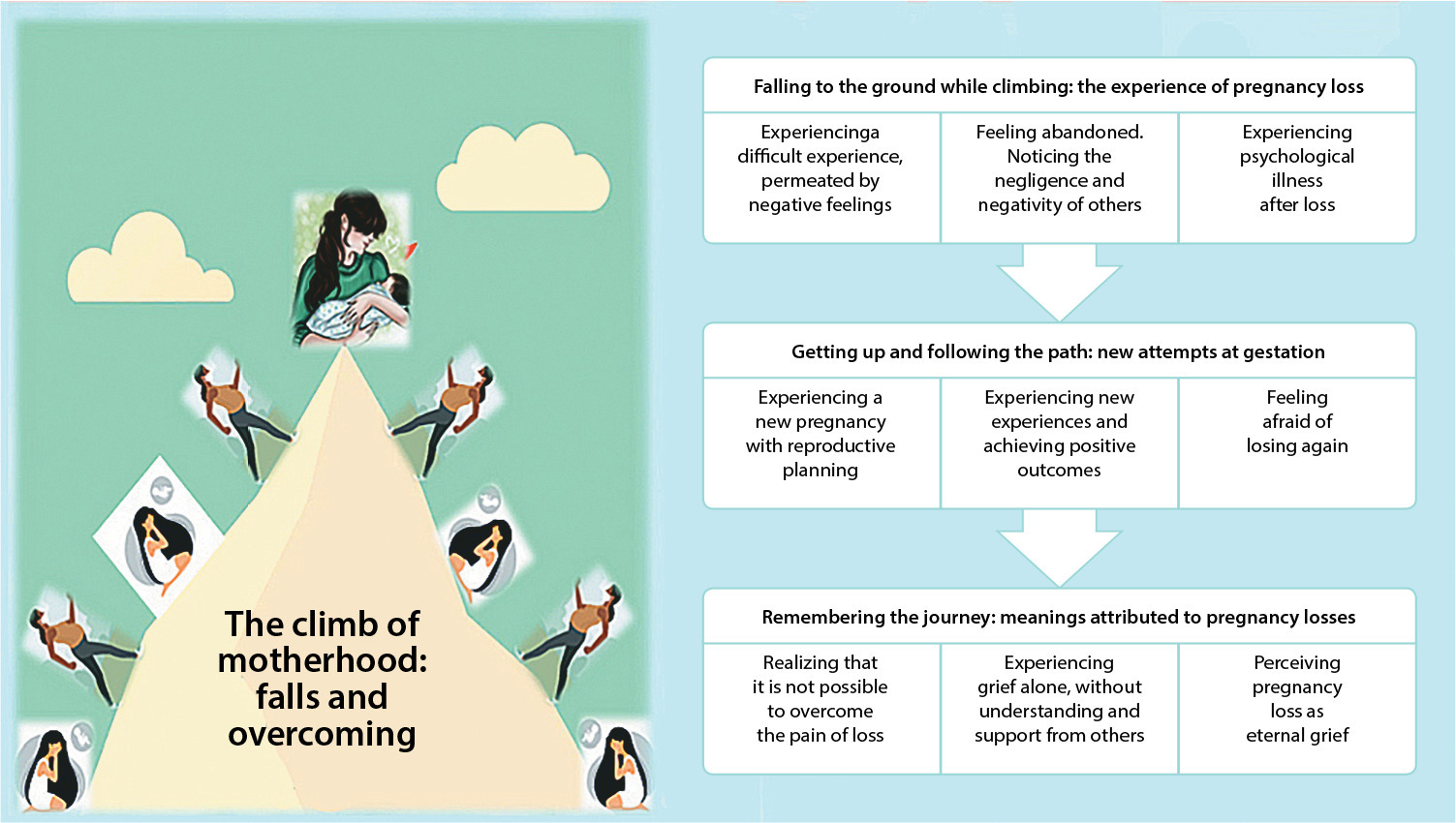
-
05-03-2024
Preditores de volume excessivo de líquidos em pacientes em hemodiálise: estudo observacional
Revista Brasileira de Enfermagem. 2024;77(1):e20220816
Abstract
Preditores de volume excessivo de líquidos em pacientes em hemodiálise: estudo observacional
Revista Brasileira de Enfermagem. 2024;77(1):e20220816
DOI 10.1590/0034-7167-2022-0816
Views0See moreRESUMEN
Objetivos:
evaluar los factores de riesgo del exceso de volumen de líquido en pacientes en hemodiálisis.
Métodos:
estudio retrospectivo de casos y controles. Se incluyeron 392 pacientes (196 casos y 196 controles) de dos centros de hemodiálisis. Se evaluaron datos sociodemográficos y 23 factores de riesgo de exceso de volumen de líquido mediante un formulario de recolección de datos. Los datos se analizaron mediante un modelo de regresión logística multivariado.
Resultados:
factores de riesgo conocimiento insuficiente (OR=2,06), ingesta excesiva de líquidos (OR=2,33), retirada inadecuada de líquidos durante la hemodiálisis (OR=2,62) e ingesta excesiva de sodio (OR=1,91) pueden aumentar aproximadamente dos veces la posibilidad de que se produzca un exceso de volumen de líquido en pacientes en hemodiálisis. La educación (OR=0,95) y la edad (OR=0,97) son factores protectores del volumen excesivo de líquido.
Conclusiones:
conocer estos factores de riesgo puede ayudar a las enfermeras a realizar una inferencia diagnóstica precisa y rápida del riesgo de volumen excesivo de líquidos.
-
REVIEW05-03-2024
Nursing interventions to empower the family caregiver of person with lower limb amputation: scoping review
Revista Brasileira de Enfermagem. 2024;77(1):e20230264
Abstract
REVIEWNursing interventions to empower the family caregiver of person with lower limb amputation: scoping review
Revista Brasileira de Enfermagem. 2024;77(1):e20230264
DOI 10.1590/0034-7167-2023-0264
Views0See moreABSTRACT
Objectives:
to map nursing interventions that empower the Family caregiver of the person with lower limb amputation for is role.
Methods:
scoping review guided by Joanna Briggs Institute methodology conducted in different databases (including gray literature).
Results:
six studies published between 2009 and 2021 were included. Interventions of counselling and support for patients and family; peer support interventions performed by a certified pair; involvement of caregivers or family members in support groups; and key interventions for patient and family caregiver psychological balance. Two studies discussed the importance of caregiver and amputee training and development of coping skills. Another study recommended Interventions of informative support for caregivers regarding care for the amputee and adaptation to home.
Conclusions:
results of this review allow the identification of recommendations (guidelines) for practice and recommendations/suggestions for interventions according with identified needs of family caregivers of patients with lower limb amputation.
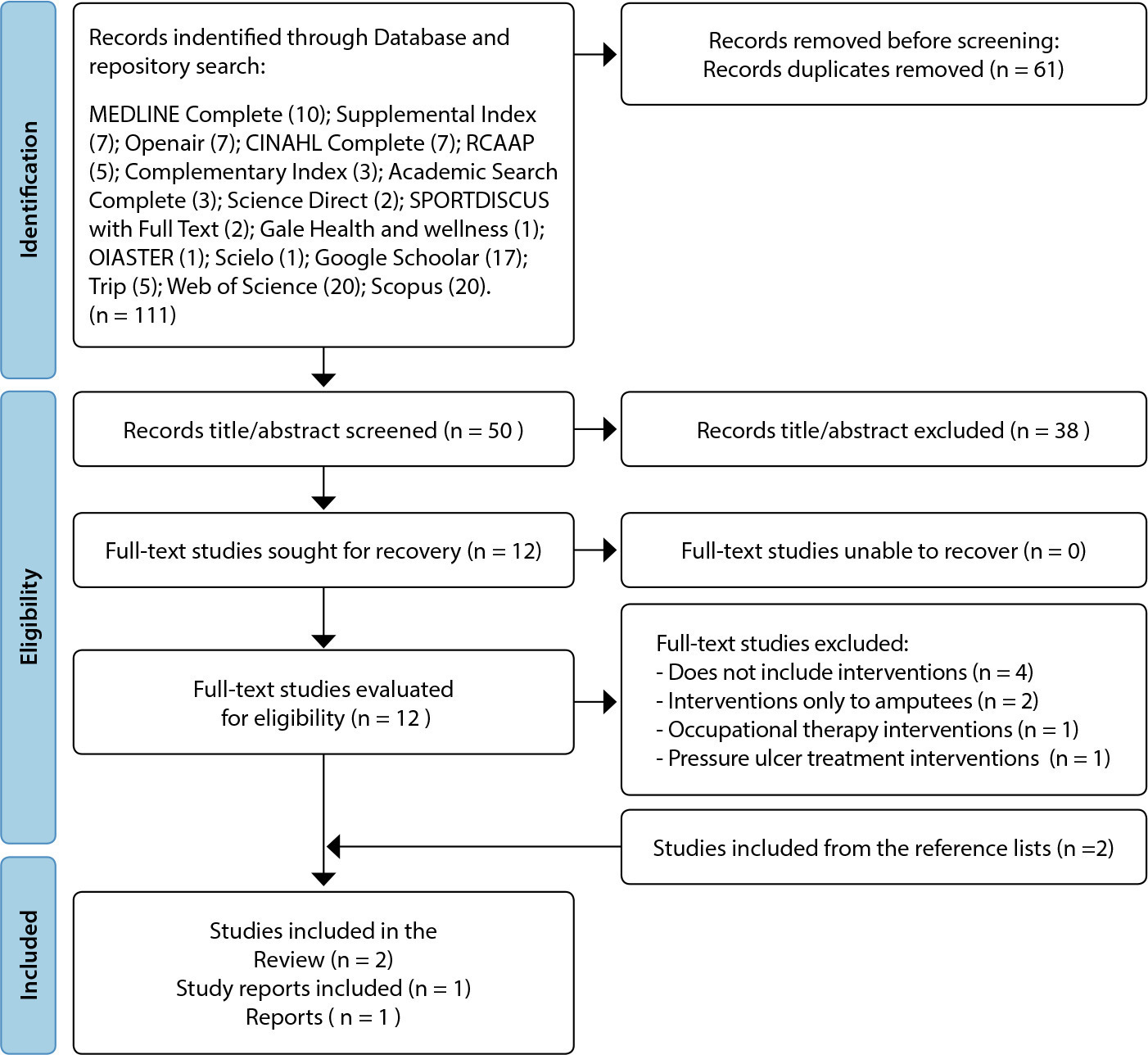
-
05-03-2024
Intervenções de Enfermagem para capacitar o cuidador familiar de uma pessoa com amputação de membro inferior: revisão de escopo
Revista Brasileira de Enfermagem. 2024;77(1):e20230264
Abstract
Intervenções de Enfermagem para capacitar o cuidador familiar de uma pessoa com amputação de membro inferior: revisão de escopo
Revista Brasileira de Enfermagem. 2024;77(1):e20230264
DOI 10.1590/0034-7167-2023-0264
Views0See moreRESUMEN
Objetivos:
mapear intervenciones de enfermería que capaciten al cuidador familiar de la persona con amputación de miembro inferior para su rol.
Métodos:
es una revisión de alcance guiada por la metodología del Instituto Joanna Briggs, llevada a cabo en diferentes bases de datos (incluyendo literatura gris).
Resultados:
se tuvieron en cuenta seis estudios publicados entre 2009 y 2021, a saber: intervenciones de asesoramiento y apoyo para pacientes y familiares; intervenciones de apoyo entre iguales realizadas por un par de profesionales certificados; participación de cuidadores o familiares en grupos de apoyo e intervenciones clave para el equilibrio psicológico del paciente y del cuidador familiar. Dos estudios analizaron la importancia de la formación del cuidador y del amputado y del desarrollo de habilidades de afrontamiento. Otro estudio recomendó intervenciones de apoyo informativo para los cuidadores en relación con el cuidado del amputado y su adaptación a la vida hogareña.
Conclusiones:
los resultados de esta revisión permiten identificar recomendaciones/directrices para la práctica y recomendaciones/sugerencias de intervenciones según las necesidades identificadas de los cuidadores familiares de pacientes con amputación de miembros inferiores.
-
05-03-2024
Propiedades psicométricas de la versión chilena del cuestionario de calidad de vida para mieloma múltiple
Revista Brasileira de Enfermagem. 2024;77(1):e20230100
Abstract
Propiedades psicométricas de la versión chilena del cuestionario de calidad de vida para mieloma múltiple
Revista Brasileira de Enfermagem. 2024;77(1):e20230100
DOI 10.1590/0034-7167-2023-0100es
Views0See moreRESUMEN
Objetivos:
Evaluar consistencia interna y validez de constructo del QLQ-MY20 para valoración de calidad de vida en sobrevivientes de mieloma múltiple en Chile.
Métodos:
Estudio transversal, realizado entre marzo 2020 y diciembre 2022. Participaron 118 personas de dos hospitales públicos. Se utilizaron los cuestionarios QLQ-C30 y QLQ-MY20. Fueron evaluadas la consistencia interna con alfa de Cronbach (α) y validez de constructo mediante pruebas de hipótesis (Mann Whitney y correlación de Spearman).
Resultados:
El promedio de edad de los participantes era 67,2 (DE=9,2) años. Consistencia interna para escala completa (α=0,779), dimensión “síntomas de la enfermedad” (α=0,671), dimensión “efectos secundarios de los tratamientos” (α=0,538) y dimensión “perspectiva de futuro” (α=0,670). Se comprobaron cuatro de las cinco hipótesis de la validez de constructo: presentaron más síntomas las mujeres, personas con peor performance estatus, con dolor y con peor fatiga.
Conclusiones:
La versión chilena del QLQ-MY20 presenta adecuada consistencia interna y validez de constructo.
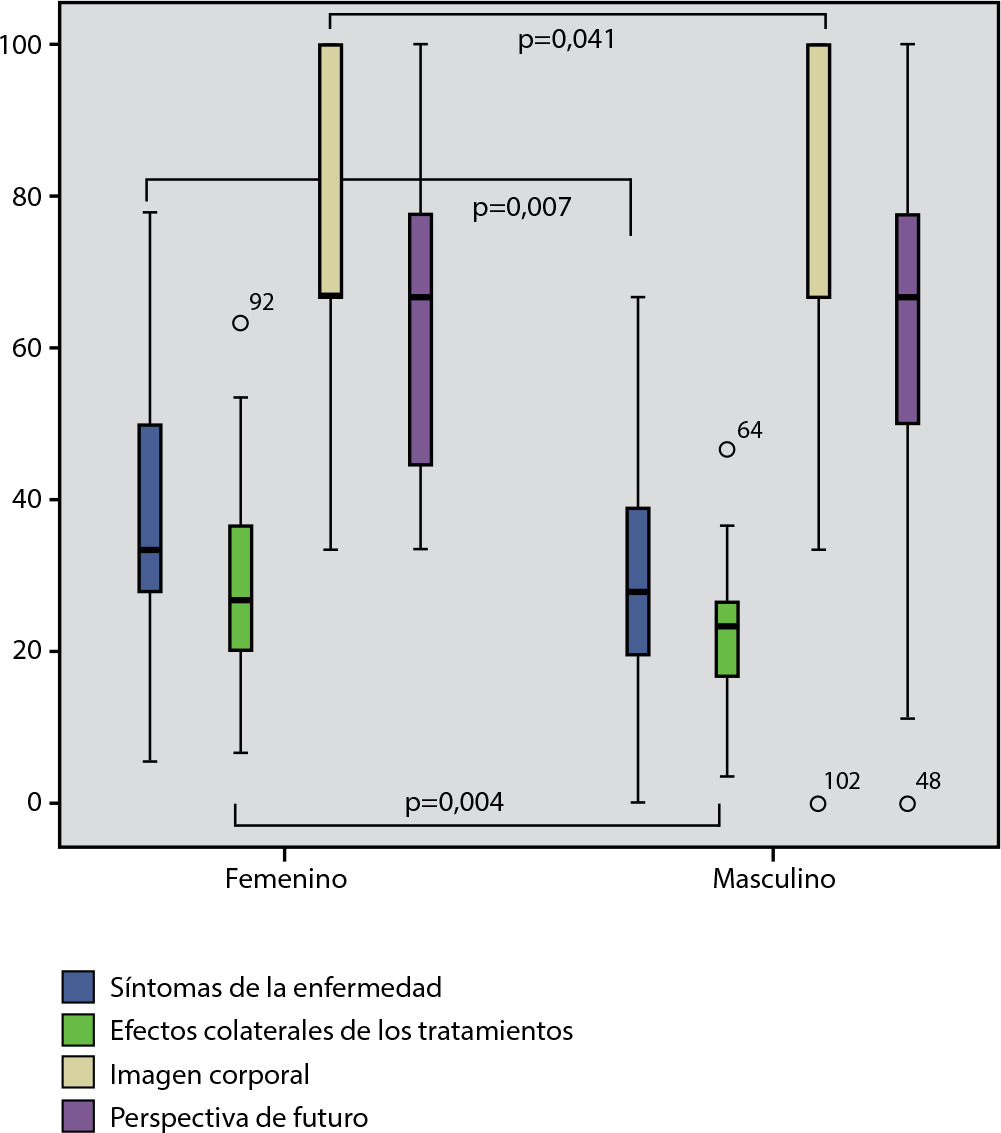
-
EXPERIENCE REPORT01-01-2017
Focus group on qualitative research: experience report
Revista Brasileira de Enfermagem. 2017;70(2):424-429
Abstract
EXPERIENCE REPORTFocus group on qualitative research: experience report
Revista Brasileira de Enfermagem. 2017;70(2):424-429
DOI 10.1590/0034-7167-2016-0091
Views1See moreABSTRACT
Objective:
to report the experience of applying the focus group technique for production of data in qualitative research.
Method:
four group sessions were held from May to June 2015, with the participation of professionals from the public sector of PHC and from specialized service.
Results:
the way focus group was developed is described in steps: planning, recruitment, ambience, group sessions, and evaluation.
Conclusion:
we highlight that the focus group, as a technique to produce data in collective space, can contribute not only to the construction of knowledge in Nursing, but also to the research approach with the assistance practice.

-
RESEARCH01-01-2017
Guide of attributes of the nurse’s political competence: a methodological study
Revista Brasileira de Enfermagem. 2017;70(3):526-534
Abstract
RESEARCHGuide of attributes of the nurse’s political competence: a methodological study
Revista Brasileira de Enfermagem. 2017;70(3):526-534
DOI 10.1590/0034-7167-2016-0483
Views0See moreABSTRACT
Objective:
To build and validate a guide of attributes of the nurse’s political competence.
Method:
Methodological research. This study comprised the construction of the instrument through literature review; experts validation of pre-established attributes for composing the guide; and clinical validation in the nurses work environment/reality. The data collection took place in the months from August to October 2014, and the analysis was based on the content analysis of Bardin and use of Epi info 3.5. All ethical precepts have been complied with.
Results:
From 29 attributes found in the literature, 25 have been validated by experts. Clinical/practical validation involved the participation of 43 nurses, who observed that the attributes are not articulated with the professional practices developed by them.
Conclusion:
The attributes of the nurse’s political competence were identified with support of literature. It is concluded that the professionals still have limited and fragmented perception of political competence, expressing difficulty/limitation.
-
ORIGINAL ARTICLE11-26-2022
Vulnerability and quality of life of older persons in the community in different situations of family care
Revista Brasileira de Enfermagem. 2022;75:e20210034
Abstract
ORIGINAL ARTICLEVulnerability and quality of life of older persons in the community in different situations of family care
Revista Brasileira de Enfermagem. 2022;75:e20210034
DOI 10.1590/0034-7167-2021-0034
Views0See moreABSTRACT
Objective:
to correlate socio-contextual aspects, physical vulnerability and quality of life of older persons in the community in different situations of family care.
Methods:
epidemiological, a cross-sectional and analytical study, with elderly people in the community (n=769), with application of the instruments: Vulnerable Elders Survey-13 (VES-13), World Health Organization Quality of Life for Older Persons (WHOQOL-OLD) and the World Health Organization Quality of Life (WHOQOL-BREF); and socio-contextual data questionnaire.
Results:
the population assessed presented an average of regular quality of life in both the WHOQOL-BREF and the WHOQOL-OLD. Older non-vulnerable persons (62.2%) and those with close family contact (82.6%) have a better quality of life than the vulnerable (p<0.0001).
Conclusion:
lower quality of life scores and more distant families are related to vulnerable elderly people; thus, the assessment of family proximity and physical vulnerability of older persons is shown to be an important factor in improving quality of life.
-
ORIGINAL ARTICLE10-09-2023
Independent and combined effects of lifestyle behaviors on adolescent health-related quality of life
Revista Brasileira de Enfermagem. 2023;76(4):e20220780
Abstract
ORIGINAL ARTICLEIndependent and combined effects of lifestyle behaviors on adolescent health-related quality of life
Revista Brasileira de Enfermagem. 2023;76(4):e20220780
DOI 10.1590/0034-7167-2022-0780
Views0See moreABSTRACT
Objective:
To investigate the independent and combined effects of lifestyle behaviors, including physical activity, sedentary behavior, sleep duration and food intake, in the health-related quality of life (HRQoL) of Brazilian adolescents.
Methods:
Cross-sectional school-based study, with the participation of 306 adolescents aged 14 to 18 years. A questionnaire was applied with structured questions to collect lifestyle behaviors data. Perception of the HRQoL was identified using the Kidscreen-27. The study used covariance analysis and linear regression models for statistical analysis.
Results:
Adolescents who reported ≤ 2 hours/day of screen-based sedentary behavior and sleep duration equivalent to 8-10 hours/night presented significantly higher HRQoL. Adolescents who reported joint adherence ≥ 3 healthy lifestyle behaviors demonstrated approximately two [OR=2.12] to three times [OR=3.04] more chance of presenting higher perceptions of HRQoL.
Conclusion:
Although healthy lifestyle behaviors had a positive independent effect on HRQoL, joint adherence to healthy behaviors enhances the cumulative effect.

-
ORIGINAL ARTICLE12-04-2023
Social representation of spiritual surgeries in Umbanda: culture, religion and contributions of nursing theory
Revista Brasileira de Enfermagem. 2023;76(6):e20220787
Abstract
ORIGINAL ARTICLESocial representation of spiritual surgeries in Umbanda: culture, religion and contributions of nursing theory
Revista Brasileira de Enfermagem. 2023;76(6):e20220787
DOI 10.1590/0034-7167-2022-0787
Views1See moreABSTRACT
Objective:
to analyze the social representation of spiritual surgeries in Umbanda for Bantu-Amerindian ritual mediums and their contributions to the cross-cultural care proposed by Madeleine Leininger.
Methods:
a descriptive-exploratory, qualitative study, supported by the procedural approach of Social Representation Theory and Transcultural Nursing Theory, carried out with 30 Umbanda mediums of the Bantu-Amerindian ritual through interviews, submitted to the Iramuteq software for lexical analysis.
Results:
mostly women, white, with an average of 46 years old and approximately 14 years of practice in Umbanda participated. The social representation of spiritual surgeries in Umbanda is objectified and anchored through a biomedical vision of care, encompassing a set of beliefs, values and practices as religious treatments, through faith, whose main objective is healing.
Final considerations:
spiritual surgeries are a form of transcultural care, according to Madeleine Leininger’s propositions, as they integrate the culture of a group through health care in Umbanda.

-
ORIGINAL ARTICLE05-29-2023
Quality of life from women’s perspective in the exercise of sex work: a study of social representations
Revista Brasileira de Enfermagem. 2023;76:e20220169
Abstract
ORIGINAL ARTICLEQuality of life from women’s perspective in the exercise of sex work: a study of social representations
Revista Brasileira de Enfermagem. 2023;76:e20220169
DOI 10.1590/0034-7167-2022-0169
Views1See moreABSTRACT
Objectives:
to analyze the social representations elaborated by sex workers from Alto Sertão Produtivo Baiano about quality of life.
Methods:
a qualitative study, based on the Social Representation Theory, carried out in the region of Alto Sertão Produtivo Baiano, with 30 sex workers. Individual in-depth interview was carried out, with speeches organized in a corpus and treated in IRAMUTEQ, enabling lexical analysis for Descending Hierarchical Classification.
Results:
four thematic classes emerged, in which social representations of quality of life pervade: money earned to supply needs; association with healthy living and obtaining health (physical and mental); balance of emotions (although there are some negative sensations such as fear and anxiety); and faith in a deity.
Final Considerations:
the social representations elaborated by sex workers about quality of life are anchored in concepts, subjective and practical, punctuated by the World Health Organization.

-
ORIGINAL ARTICLE05-29-2023
Violence in rural areas against disabled people from the perspective of their families
Revista Brasileira de Enfermagem. 2023;76:e20220404
Abstract
ORIGINAL ARTICLEViolence in rural areas against disabled people from the perspective of their families
Revista Brasileira de Enfermagem. 2023;76:e20220404
DOI 10.1590/0034-7167-2022-0404
Views0See moreABSTRACT
Objectives:
to know the violence spoken and felt by disabled people, living in rural areas, from the perspective of their families.
Methods:
a descriptive-exploratory and qualitative study, carried out in four municipalities in Rio Grande do Sul, Brazil. Twelve family members who lived with disabled people in rural areas participated. Data were collected through semi-structured interviews and analyzed using thematic content analysis.
Results:
disabled people, living in rural areas, experienced physical, psychological and sexual violence, perpetrated by family members, colleagues, community members and health professionals. Adaptations were mentioned in family dynamics for the care of disabled people, social, financial and leisure impacts, and challenges in access and accessibility to education and health services.
Final Considerations:
violence against this population manifests itself in a reality with socioeconomic and family particularities, marked by exclusion, disrespect and denial of rights and access to fundamental goods and services.

-
ORIGINAL ARTICLE12-08-2023
Care for older adults with disabilities in Long Term Care Facility
Revista Brasileira de Enfermagem. 2023;76:e20220767
Abstract
ORIGINAL ARTICLECare for older adults with disabilities in Long Term Care Facility
Revista Brasileira de Enfermagem. 2023;76:e20220767
DOI 10.1590/0034-7167-2022-0767
Views0See moreABSTRACT
Objective:
to analyze the constitution of care offered to older adults with disabilities, from Long Term Care Facility professionals’ perspective.
Methods:
this is a discourse analysis based on the post-structuralist framework. Participants in this study are professionals involved in the care for older adults, totaling 14 respondents, 13 women and one man.
Results:
from professionals’ perspective, there is a fine line between caring for older adults with disabilities and maintaining their autonomy. Care in which autonomy is restricted predisposes older adults to a process of dependency.
Final considerations:
caring for older adults with disabilities constitutes the challenge between caring and maintaining independence. Thus, older adult-centered care should be taken as a premise so that their individualities are respected.
-
REVIEW07-17-2020
Approaches to workload in psychiatric and mental health nursing
Revista Brasileira de Enfermagem. 2020;73:e20190620
Abstract
REVIEWApproaches to workload in psychiatric and mental health nursing
Revista Brasileira de Enfermagem. 2020;73:e20190620
DOI 10.1590/0034-7167-2019-0620
Views0See moreABSTRACT
Objective:
to investigate approaches to workload in psychiatric and mental health nursing in Brazilian and international production of knowledge
Methods:
integrative literature review using six databases, covering January 2005 to March 2019. Articles in full in English, Spanish and Portuguese were included.
Results:
the sample consisted of 23 original articles classified as quantitative or emotional. The quantitative dimension was addressed in 12 articles and included: assessing patient care needs, identifying activities performed by the team, measuring time spent and developing and validating a measurement instrument. The emotional dimension included 11 articles the focus of which was on identifying stressors in the workplace, psychosocial risks and coping strategies.
Conclusion:
strategies were found for measuring workload and assessing the impact of stressors on nursing teams.
-
ORIGINAL ARTICLE08-30-2021
Historical aspects in pain management in palliative care in an oncological reference unit
Revista Brasileira de Enfermagem. 2021;74(5):e20200761
Abstract
ORIGINAL ARTICLEHistorical aspects in pain management in palliative care in an oncological reference unit
Revista Brasileira de Enfermagem. 2021;74(5):e20200761
DOI 10.1590/0034-7167-2020-0761
Views0See moreABSTRACT
Objective:
Describe the actions implemented for pain management in palliative care oncology and analyze the contribution of Hospital do Câncer IV, as a reference unit at the National Cancer Institute.
Methods:
Study of the history of the present time, whose sources were written documents and interviews with five participants. The collection took place from February to June 2018. The analysis of the written sources took place through internal and external criticism of the documents, considering their chronology and theme.
Results:
Professionals contributed with actions for pain management in palliative oncology care: in discussions and final drafting of ordinances, as rapporteurs at national and international events, in the elaboration of humanization conducts and systematization of assistance in addressing pain.
Final considerations:
These actions favored assistance in palliative oncology care at various levels of health care for patients and families, with greater technical and scientific recognition for all.
-
REVIEW04-16-2021
Nursing assistance in patient care with external ventricular drain: a scoping review
Revista Brasileira de Enfermagem. 2021;74(2):e20190796
Abstract
REVIEWNursing assistance in patient care with external ventricular drain: a scoping review
Revista Brasileira de Enfermagem. 2021;74(2):e20190796
DOI 10.1590/0034-7167-2019-0796
Views0See moreABSTRACT
Objectives:
to map the available evidence about nursing care aimed at adult patients using external ventricular drain.
Methods:
this is a review using the scoping review method.
Results:
Initially, 965 studies were identified and, after the eligibility criteria, a sample of 54 publications was obtained. Each of them was assessed according to GRADE, resulting in three studies with high quality; 14 with moderate quality; 32 with low quality; and five with very low quality. It was highlighted 20 nursing care subdivided into nine categories, namely: drainage system; bed positioning and mobilization; catheter care; monitoring of intracranial pressure; and medication administration.
Conclusions:
the scoping review made it possible to identify the main nursing care directed to adult patients undergoing placement of external ventricular drain from the evidence available to date.

-
REVIEW07-14-2021
Stress level experienced by participants in realistic simulation: a systematic review
Revista Brasileira de Enfermagem. 2021;74(4):e20201151
Abstract
REVIEWStress level experienced by participants in realistic simulation: a systematic review
Revista Brasileira de Enfermagem. 2021;74(4):e20201151
DOI 10.1590/0034-7167-2020-1151
Views0See moreABSTRACT
Objectives:
to identify the available evidence regarding stress levels experienced by participants in education based on a realistic simulation.
Methods:
systematic review that included randomized clinic trials on electronic databases: Cumulative Index to Nursing and Allied Health Literature, Cochrane Library, Latin-American and Caribbean Literature in Health Sciences, LIVIVO, PubMed, Scopus, and Web of Science. The additional search was performed on Google Scholar and OpenGrey. All searches occurred on September 24, 2020. The methodologic quality of the results was evaluated by the Cochrane Collaboration Risk of Bias Tool.
Results:
eighteen studies were included, which evaluated the participants’ stress using physiologic, self-reported measures, or the combination of both. Stress as experienced in a high level in simulated scenarios.
Conclusions:
evidence of the study included in this systematic review suggest that stress is experienced in a high level in simulated scenarios.

-
ORIGINAL ARTICLE09-21-2020
Adaptive problems arising out of the progenitor’s abandonment after Zika Congenital Syndrome
Revista Brasileira de Enfermagem. 2020;73:e20190602
Abstract
ORIGINAL ARTICLEAdaptive problems arising out of the progenitor’s abandonment after Zika Congenital Syndrome
Revista Brasileira de Enfermagem. 2020;73:e20190602
DOI 10.1590/0034-7167-2019-0602
Views0See moreABSTRACT
Objective:
to reveal the adaptive problems of the woman abandoned by the child’s parent after Congenital Zika Syndrome, in the light of Roy’s Adaptation Model.
Method:
a qualitative, descriptive study, based on Roy’s Adaptation Model, developed with six women abandoned by their child’s parent after Zika Congenital Syndrome diagnosis, through interview and Content Analysis technique.
Results:
adaptive problems appeared in nutrition, activity, rest, and protection patterns, due to limitations in self-care; self-concept, related to dissatisfaction with body image and personal being; in the role of transition role, through difficulties in taking over new roles and in interdependence, related to changes in affective needs.
Final considerations:
the overload of care for children with Congenital Zika Syndrome, added to the challenges of the abandoned woman by her child’s parent, led to adaptive problems, showing their main difficulties of coping.
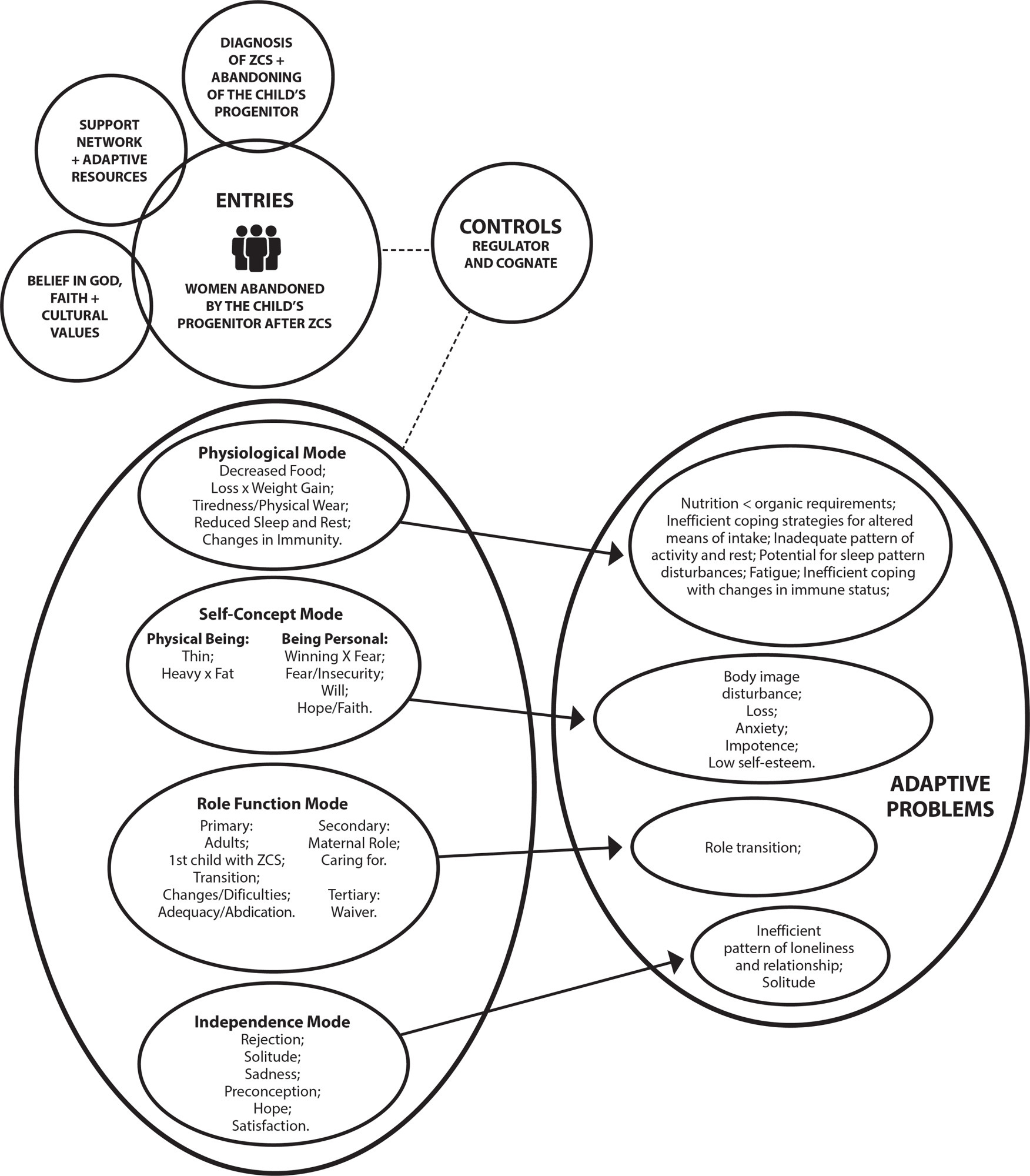
-
ORIGINAL ARTICLE05-28-2021
Nurses’ educational practices in Family Health Strategy
Revista Brasileira de Enfermagem. 2021;74(2):e20200045
Abstract
ORIGINAL ARTICLENurses’ educational practices in Family Health Strategy
Revista Brasileira de Enfermagem. 2021;74(2):e20200045
DOI 10.1590/0034-7167-2020-0045
Views0See moreABSTRACT
Objectives:
to analyze the nurse’s educational practice in Family Health Strategy.
Methods:
descriptive study with a qualitative approach, whose data production used the World Café group technique, in two meetings, with 26 nurses of a health district of Manaus-AM. The technique used was Categorial-Thematic Content Analysis.
Results:
the study generated two units of analysis: Political and Organizational Configuration of Educational Work at ESF and Operational Configuration of Educational Work at ESF, revealing the necessary (re)configurations in co-management, in the centrality of the subject for the planning of educational work, and in (re)pactuation between the management of services and training institutions to overcome contradictions in the implementation of National Policies on Permanent Education and Basic Health Care.
Conclusions:
the configuration of nurses’ educational practice at ESF works toward interactions, organized to respond to health policies, incorporating creativity in doing, but facing numerous obstacles.
-
REFLECTION11-11-2020
Children with special needs in health: challenges of the single health system in the 21st century
Revista Brasileira de Enfermagem. 2020;73:e20190037
Abstract
REFLECTIONChildren with special needs in health: challenges of the single health system in the 21st century
Revista Brasileira de Enfermagem. 2020;73:e20190037
DOI 10.1590/0034-7167-2019-0037
Views0See moreABSTRACT
Objective:
Reflect on the gaps in the care of Children with Special Needs in Health that demand complex clinical care with dependence on technological support for the maintenance of life, in the Unified Health System.
Methods:
This is a reflection study based on recent policies and literature related to the theme.
Discussion:
Despite the advances achieved with the Unified Health System with regard to access to health services and the expansion of Primary Care, with the aim of reorienting health, it can be said that the health care model for CSHCN in Brazil is still centered on the hospital and medical knowledge.
Final considerations:
There are gaps in the policies for children aimed at the new paediatric profile, and little is discussed about its implications for the Unified Health System.
-
REVIEW07-31-2020
Educational practices for families of children and adolescents using a permanent venous catheter
Revista Brasileira de Enfermagem. 2020;73:e20190129
Abstract
REVIEWEducational practices for families of children and adolescents using a permanent venous catheter
Revista Brasileira de Enfermagem. 2020;73:e20190129
DOI 10.1590/0034-7167-2019-0129
Views0See moreABSTRACT
Objectives:
to identify, in the scientific literature, the educational practices performed by nurses with the families of children and adolescents using long-term venous catheters, concerning home care.
Methods:
integrative review in LILACS, PubMed, SCOPUS, Web of Science and CINAHL databases, from August to September 2018.
Results:
we analyzed eight articles that met the inclusion criteria. The results showed that all studies are international, mostly North American and with low level of evidence. The educational practices found were home visits, production of printed educational materials, use of mannequins for simulation, creation of an educational video, and combined educational practices.
Final Considerations:
the care provided by families at home in the countries studied is more complex than in Brazil, and the conclusion is that Brazilian studies need to advance in publications related to this area.
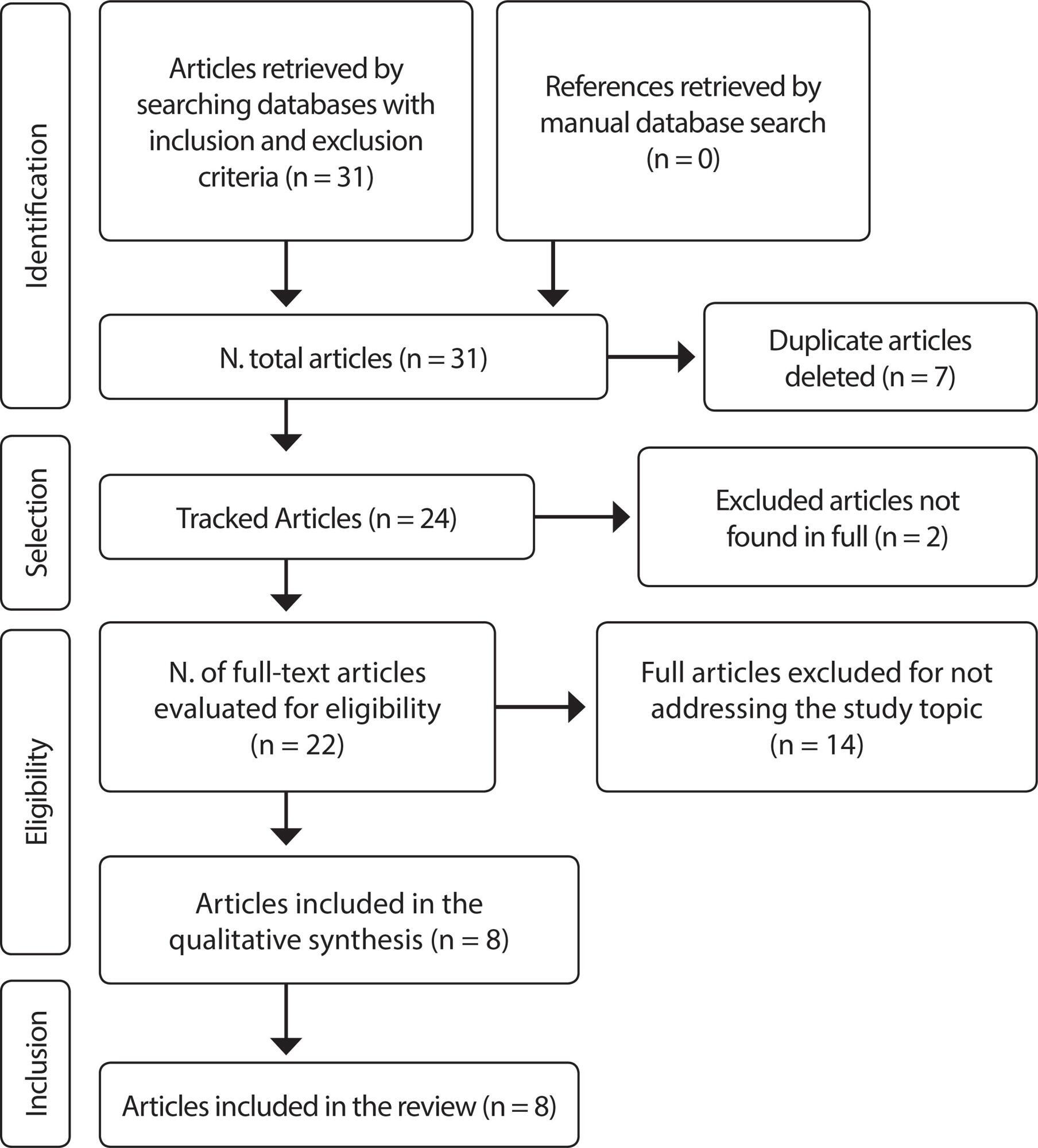
Search
Search in:
Nuvem de Tags
Adolescente (85) Atenção Primária à Saúde (239) COVID-19 (91) Criança (91) Cuidados de Enfermagem (269) Educação em Enfermagem (151) Educação em Saúde (139) Enfermagem (930) Enfermagem Pediátrica (86) Estudantes de Enfermagem (77) Estudos de Validação (131) Família (87) Idoso (208) Promoção da Saúde (99) Qualidade de Vida (104) Saúde do Trabalhador (86) Saúde Mental (145) Saúde Pública (82) Segurança do Paciente (150) Tecnologia Educacional (100)



